- Home
- Alison Weir
Life of Elizabeth I Page 4
Life of Elizabeth I Read online
Page 4
Dudley was almost six feet tall and very attractive; his skin was so dark as to earn him the nickname of 'the Gypsy', a name used by some to refer to his moral character rather than his face. Sir Robert Naunton described him as 'a very goodly person and singular well-featured, and all his youth well-favoured, but high-foreheaded.' He had red-brown hair, a reddish beard and moustache, a high-bridged nose and sardonic, heavy-lidded eyes. Elizabeth much admired his long, slender fingers. As a young man he was lean and muscular, with long, shapely legs, and showed his physique off to advantage in fine and fashionable clothes. He was dynamic and energetic: he jousted, rode, played tennis and archery, and enjoyed fishing. He could also dance and sing well, and was an excellent conversationalist. A true Renaissance man, he was fascinated by science, mathematics, geometry, astronomy, cartography and navigation, had read many classical authors and could speak both French and Italian fluently. It is possible that Dr John Dee, the notable scientist, astrologer and reputed magician, had been his tutor, for Dee had once been a member of Northumberland's household, and it was not long before Dudley would introduce Dee to Queen Elizabeth, who came to set great store by the doctor's wisdom and knowledge and would often accompany Dudley to his house at Mortlake.
Dudley's appointment and his obvious favour with the young Queen dismayed those at court who feared a revival of his family's ambitions. Some remembered that not only his father but also his grandfather, Edmund Dudley, had gone to the block for treason, the latter at the beginning of Henry VIII's reign, although it now seems likely that Edmund was merely a scapegoat for Henry VII's unpopular financial policies. Yet it was not long before Elizabeth's favour extended to other members of the Dudley family, notably Robert's brother Ambrose and his sister Mary, the wife of Sir Henry Sidney of Penshurst, who became one of the Ladies of the Bedchamber to whom the Queen was most devoted.
Throughout the 18th and 19th of November Elizabeth worked with her advisers to form a new administration, and on 20 November the Privy Council and a large section of the peerage, come to make obseisance to the Queen, met formally in the great hall at Hatfield to hear Elizabeth name the men she had chosen as her chief advisers and make her first public speech.
First, Sir William Cecil's appointment as Secretary of State was announced, and he took the oath of office. The office of Secretary was not the greatest that the Queen could bestow, but it would enable her to form a close working relationship with Cecil, whom she trusted above all other men. He, however, had his misgivings, for he subscribed to the almost universal masculine view that women, being wayward, emotional, weak and vacillating creatures, were unfit to govern and incapable of running an administration. Elizabeth, who was in time to prove him wrong, now displayed for the first time as queen the regal command and dignified style of oration that was to characterise her public appearances, and told him: 'I give you this charge that you shall be of my Privy Council and content to take pains for me and my realm. This judgement I have of you, that you will not be corrupted with any manner of gifts, and that you will be faithful to the state; and that, without respect of my private will, you will give me that counsel which you think best; and if you shall know anything necessary to be declared to me of secrecy, you shall show it to myself only; and assure yourself I will not fail to keep taciturnity therein.'
The rotund and amiable lawyer Sir Nicholas Bacon was then sworn in as Lord Keeper of the Great Seal, the office of Lord Chancellor being then temporarily in abeyance, then other appointments were announced. Katherine Parr's brother William, out of favour under Mary, was restored to the Marquessate of Northampton and made a Privy Councillor; Sir Nicholas Throckmorton, a zealous and vocal Protestant, became Chamberlain of the Exchequer. Sir Francis Knollys, another fanatical Protestant who was hurrying home from exile upon receiving news of Elizabeth's accession, was the husband of the Queen's cousin Katherine Carey, daughter of Anne Boleyn's sister Mary, and was made a Privy Councillor. Ten of the councillors who had served under Mary were retained, including the Marquess of Winchester and the Earls of Shrewsbury, Derby, Arundel and Pembroke; most were middle-aged men of considerable experience, whose conspiracies against her in the previous reign Elizabeth was prepared to overlook, although she could never bring herself to like Arundel or Pembroke. Those of Mary's councillors who had displayed strong Catholic loyalties were dismissed and replaced with Protestant lords of Elizabeth's own choosing, but the new Privy Council was to be smaller than it had been under Mary, Elizabeth believing, with reason, that forty-four 'councillors would make rather discord and confusion than good counsel'.
Elizabeth then addressed the assembly from her throne under the canopy of estate.
The law of Nature moves me to sorrow for my sister. The burthen that is fallen upon me maketh me amazed; and yet, considering that I am God's creature, ordained to obey His appointment, I will yield thereto, desiring from the bottom of my heart that I may have assistance of His grace to be the minister of His heavenly will in this office now committed to me. And as I am but one body, so I shall require you all, my lords, to be assistant to me, that I with my ruling, and you with your service, may make a good account to Almighty God, and leave some comfort to our posterity on Earth.
I mean to direct all mine actions by good advice and counsel. My meaning is to require of you all nothing more but faithful hearts, and of my good will you shall not doubt, using yourselves as good and loving subjects.
For the next three days she was busy, drawing up lists of councillors, formulating policies, cranking the machinery of government into action, and planning her household appointments. First to be promoted were those who had served her faithfully as princess. Her former governess, Katherine Ashley, was made Mistress of the Robes and First Lady of the Bedchamber with responsibility for the maids of honour, who were all young girls from noble families. Ashley's husband John was to be Master of the Jewel House, while Elizabeth's former treasurer, Thomas Parry, was knighted and made Comptroller of the Household. Her old Welsh nurse, Blanche Parry, who had served her since birth and taught her the Welsh language, was appointed Keeper of the Queen's Books. Sir Francis Knollys became Vice-Chamberlain of the Household; his daughter Laetitia, known as Lettice, was one of the Queen's first maids of honour. Another of Elizabeth's cousins, Henry Carey, Mary Boleyn's son and a man of great abilities, was raised to the peerage as Baron Hunsdon.
Several of those Catholic ladies who had served Queen Mary were dismissed and replaced with ladies who professed Protestant beliefs. The Queen was an exacting and demanding mistress who expected high standards to prevail in her household. She disliked employing anyone who was ugly, and once turned down an application for a position from a man whose handsome face was marred by a missing tooth. Yet those who were lucky enough to secure places in the royal household were well looked after, even when they became old or sick. Then the Queen would ensure that they received 'good pensions'.
When Queen Mary lay dying, King Philip had sent an ambassador, the Count de Feria, to England, to present his master's congratulations to his wife's successor and ensure the continuance of the Anglo-Habsburg alliance, which united England and Spain against France and protected the valuable trading markets of the Habsburg-owned Low Countries from French harrassment. The alliance was very important to Philip, and he was prepared to overlook Elizabeth's suspected heretical tendencies in the interests of their common friendship. There had even been rumours, current in Mary's lifetime, that he meant to marry Elizabeth. De Feria had an audience with Elizabeth at Hatfield, at which his claim that she owed her throne to Philip's influence had met with the contempt it deserved; in this matter, she told him tartly, her gratitude was due solely to her people. But she knew it was not in her interests to alienate Spain, for she needed Philip's friendship as much as he needed hers. On the day of her accession, the Catholic Henry II of France had publicly declared that, as a bastard, Elizabeth was unfit to be Queen of England, and proclaimed as the true queen his daughter-in-law, Mary, Queen of Sc
ots, great-niece of Henry VIII.
Mary and her husband, the Dauphin Francis, were already displaying the royal arms of England quartered on their own of Scotland and France. Many Catholics had not acknowledged Henry VIII's divorce from Katherine of Aragon, mother of Mary I, nor his marriage to Anne Boleyn, and to them Mary, Queen of Scots was the rightful Queen of England. Elizabeth could not know that Henry II's actions were merely mischievous, and she was angered and immensely troubled by them, becoming even more so when she heard rumours that he intended to persuade the Pope to have her formally proclaimed 'a bastard and a heretic and ineligible to the Crown'. If Spain remained allied to England, the Pope would hardly wish to offend Philip by insulting England's Queen. Moreover, Elizabeth was resolved to win Calais back from the French, and hoped that Philip would help her; she did not yet comprehend that the French were too deeply entrenched in Calais for its recovery ever to be a realistic prospect.
Naturally, de Feria, like most other people, expected the Queen to marry. It was unthinkable that a woman would attempt to rule alone without a man to guide and protect her; he could also father her children and so ensure the continuance of the dynasty and the future security of the realm. Marriage, as Cecil later told the Queen, was her 'only known and likely surety, at home and abroad', and, as she herself acknowledged, 'There is a strong idea in the world that a woman cannot live unless she is married.'
That November, a German envoy observed, 'The Queen is of an age when she should in reason, and - as is woman's way - be eager to marry and be provided for. For that she should wish to remain a maid and never marry is inconceivable.' A husband could share 'the cares, the labours and fatigues of her government'. Although several times during Mary's reign Elizabeth had expressed her desire to remain single, most people put this down to maidenly modesty. Hardly anyone took her at her word. Besides, it was seen as unhealthy for a woman to remain unwed: marriage could provide her with the emotional and sexual satisfaction that brought physical and mental fulfilment. It was acknowledged that women who remained single were sexually frustrated, given to fantasies and lust, and had unstable minds.
In de Eeria's opinion, there was only one suitable match for Elizabeth, and that was King Philip himself. The advantages of such a union would be manifold on both sides. On 21 November the Count wrote to his master: 'The more I think about this business, the more certain I am that everything depends upon the husband this woman may take.' There was little doubt in his mind that, if King Philip proposed, Elizabeth would accept him. 'If she decides to marry out of the country, she will at once fix her eyes on Your Majesty.'
Nevertheless, the Queen had been expressing some disturbingly independent views. Whereas both Philip and de Feria had counted upon her relying on her brother-in-law's advice, both she 'and her people hold themselves free from Your Majesty, and will listen to any ambassadors who may come to treat of marriage'. There was no time to lose, for people were already talking of a marriage with the Austrian branch of the Habsburg family, which would not at present be in Spain's interests. That there would be difficulties in arranging a marriage between Elizabeth and Philip, de Feria anticipated, but 'with great negotiation and money' it might be accomplished. The ambassador went on to give his impressions of the new Queen: he thought her
sharp, without prudence. She is a very vain and clever woman. She must have been thoroughly schooled in the manner in which her father conducted his affairs. She is determined to be governed by no one.
He had been at once intrigued and baffled by her, being disconcerted by her relaxed manner during the audience and her habit of laughing meaningfully, as if she knew what he was thinking. 'She is a very strange sort of woman,' he concluded.
Rumours about his impending match with Elizabeth were rife at Philip's court at Brussels, yet for the present the King refused to acknowledge them, nor did he instruct de Feria to propose marriage. In truth, he had little inclination to marry again in England, and even less to be united with the heretical Elizabeth, whom he suspected would be less tractable than her sister.
On 23 November, Elizabeth left Hatfield with a retinue of over one thousand courtiers and travelled through Hertfordshire and Middlesex to London for her official reception as Queen. She was cheered along the way by crowds lining the streets to see her, and was received outside the City walls by the Lord Mayor, who made a speech of welcome and presented his aldermen and sheriffs to her. As, smiling, she extended her hand to each to be kissed, she saw the advancing figure of Edmund Bonner, Bishop of London - 'Bloody Bonner', who had been responsible in Mary's reign for the burning of many Protestants. As the Bishop knelt, the Queen withdrew her hand and moved away.
She then entered London and, because Whitehall Palace was not ready to receive her, took up her lodging at the Charterhouse near Smithfield, a former monastery that was now the residence of Lord North. Here she stayed for five days, receiving visitors, presiding over meetings of the Council and attending to matters of state.
On 28 November, Elizabeth, again attended by her thousand-strong retinue, removed to the royal apartments in the Tower of London. Choosing a different route from the traditional one that she would follow on the day of her coronation, she emerged sumptuously attired in purple velvet with a rich scarf around her neck, and went in procession through the packed, newly-gravelled, banner-bedecked streets of the capital to Cripplegate and Tower Hill, revelling in the acclaim of her subjects, the pretty speeches delivered by children at various places along her route, the music and singing of the City waits, the pealing of the bells of a hundred churches, and the fanfares of trumpets that announced her coming. The procession was led by the Lord Mayor of London and Garter King of Arms, with Pembroke bearing the Sword of State and Lord Robert Dudley, on a black charger, riding behind the Queen's horse. As she approached the Tower via Fenchurch Street and Gracechurch Street, 'there was great shooting of guns, the like was never heard before', which lasted half an hour.
The whole of London, it seemed, had turned out to watch her arrival, and was entranced, especially when the Queen displayed an inclination for 'stately stooping to the meanest sort' of commoner. Sir John Hay ward wrote:
If ever any person had either the gift or the style to win the hearts of the people, it was this Queen. All her faculties were in motion, and every motion seemed a well-guided action; her eye was set upon one, her ear listened to another, her judgement ran upon a third, to a fourth she addressed her speech; her spirit seemed to be everywhere. Some she pitied, some she commended, some she thanked, at others she pleasantly and wittily jested, condemning no person, neglecting no office, and distributing her smiles, looks and graces so artfully that thereupon the people again redoubled the testimony of their joys, and afterwards, raising everything to the highest strain, filled the ears of all men with immoderate extolling of their prince.
The dignified de Feria was shocked at such condescension to her subjects, but the citizens of London would not have agreed with him: they had already embarked upon their love affair with Elizabeth, and they applauded her common touch, which she contrived to exercise 'by coupling mildness with majesty' without any loss of dignity. Touched by her care for them and her vibrant youth and gracious smiles, they cried out their greetings and blessings with gusto.
As she neared the Tower, Elizabeth reined her horse to a standstill, reflecting that when she had last come here it had been as a prisoner in fear of execution. Now she expressed gratitude for her deliverance before the watching crowds: 'O Lord, Almighty and Everlasting God, I give Thee most hearty thanks that Thou hast been so merciful unto me as to spare me to behold this day.' Then, to her people:
Some have fallen from being princes of this land to be prisoners in this place. I am raised from being a prisoner in this place to be a prince of this land. That dejection was a work of God's justice. This advancement is a work of His mercy.
She then rode into the Tower precincts and entered the royal apartments, summoning the Lieutenant of the Tower to
attend her. He was Sir Henry Bedingfield, her former gaoler. Graciously, she thanked him for his services to the late queen and informed him that he was to be relieved of his duties. Yet there was no animosity in her.
'God forgive you the past, as I do,' she told him, then added mischievously, 'Whenever I have one who requires to be safely and straitly kept, I will send him to you!'
After lodging a week in the Tower, Queen and court went by river, 'with trumpets playing and melody and joy', to take up residence in Somerset House on the Strand, Elizabeth's town house when she was princess. During the winter evenings, she could be seen in her barge, being rowed along the Thames to the sound of music, attended by a host of little boats, and the Londoners grew used to her daily appearances in the streets of the capital, usually en route to dine with various courtiers. She knew well that, to retain her people's love, she had to remain visible.
On 23 December, she moved to Whitehall Palace, which was to be her principal, if not her favourite, residence. Here, the court gave itself up to daily entertainments and celebrations, its members being 'intent on amusing themselves and on dancing till after midnight', following the lead of their mistress, who was determined to enjoy her new-found freedom. Liberated from the fear of danger that had stalked her since early youth, she was thrilled to be not only the centre of attention and flattery, but also the supreme power in the land.

 Richard III and the Princes in the Tower
Richard III and the Princes in the Tower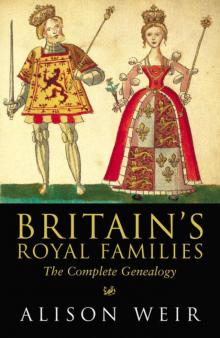 Britain's Royal Families: The Complete Genealogy
Britain's Royal Families: The Complete Genealogy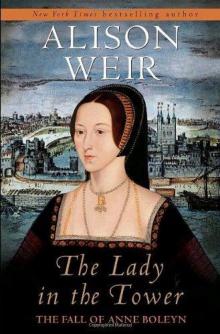 The Lady in the Tower: The Fall of Anne Boleyn
The Lady in the Tower: The Fall of Anne Boleyn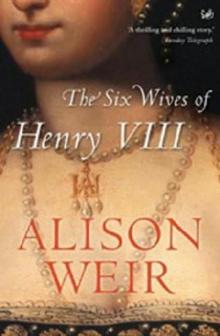 Six Wives of Henry VIII
Six Wives of Henry VIII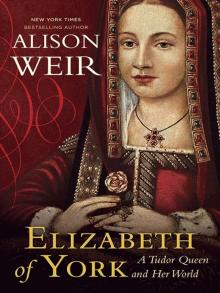 Elizabeth of York: A Tudor Queen and Her World
Elizabeth of York: A Tudor Queen and Her World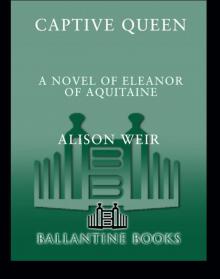 Captive Queen
Captive Queen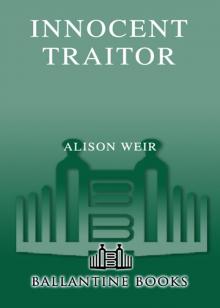 Innocent Traitor
Innocent Traitor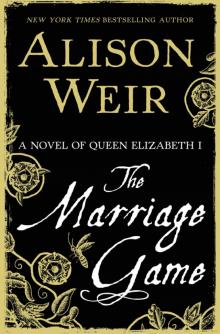 The Marriage Game
The Marriage Game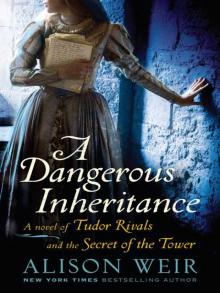 A Dangerous Inheritance
A Dangerous Inheritance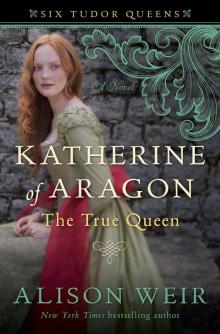 Katherine of Aragón: The True Queen
Katherine of Aragón: The True Queen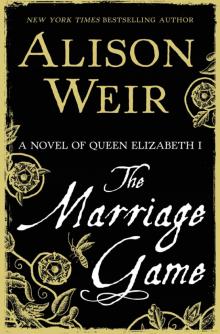 The Marriage Game: A Novel of Queen Elizabeth I
The Marriage Game: A Novel of Queen Elizabeth I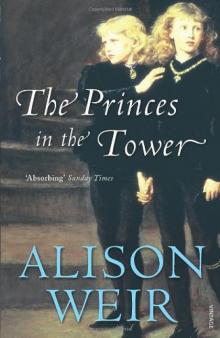 Princes in the Tower
Princes in the Tower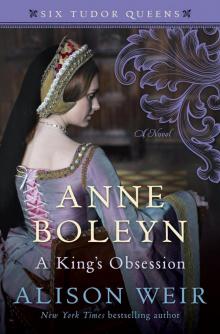 Anne Boleyn: A King's Obsession
Anne Boleyn: A King's Obsession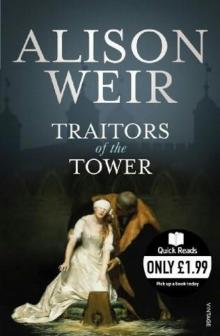 Traitors of the Tower
Traitors of the Tower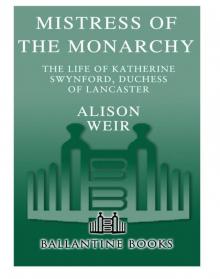 Mistress of the Monarchy: The Life of Katherine Swynford, Duchess of Lancaster
Mistress of the Monarchy: The Life of Katherine Swynford, Duchess of Lancaster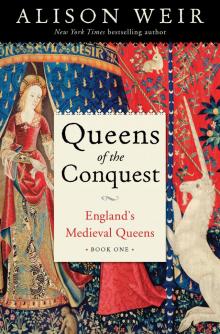 Queens of the Conquest: England’s Medieval Queens
Queens of the Conquest: England’s Medieval Queens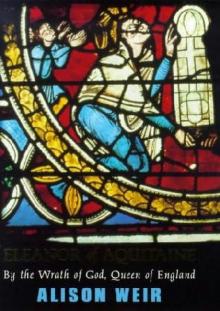 Eleanor of Aquitaine: A Life
Eleanor of Aquitaine: A Life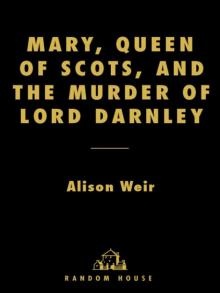 Mary, Queen of Scots, and the Murder of Lord Darnley
Mary, Queen of Scots, and the Murder of Lord Darnley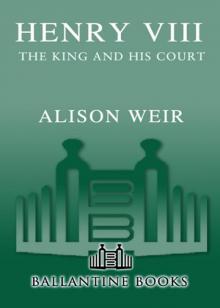 Henry VIII: The King and His Court
Henry VIII: The King and His Court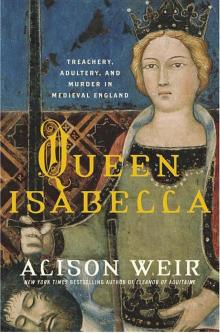 Queen Isabella: Treachery, Adultery, and Murder in Medieval England
Queen Isabella: Treachery, Adultery, and Murder in Medieval England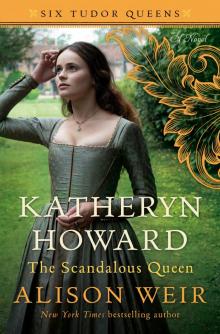 Katheryn Howard, the Scandalous Queen
Katheryn Howard, the Scandalous Queen Arthur- Prince of the Roses
Arthur- Prince of the Roses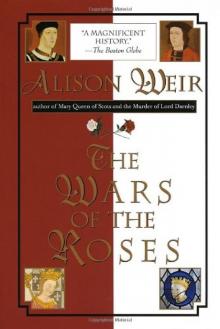 The Wars of the Roses
The Wars of the Roses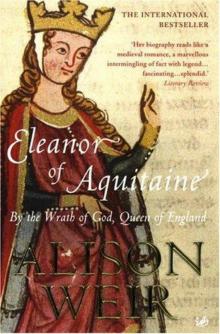 Eleanor of Aquitaine: By the Wrath of God, Queen of England
Eleanor of Aquitaine: By the Wrath of God, Queen of England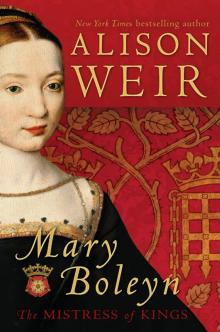 Mary Boleyn: The Great and Infamous Whore
Mary Boleyn: The Great and Infamous Whore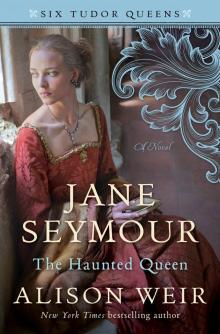 Jane Seymour: The Haunted Queen
Jane Seymour: The Haunted Queen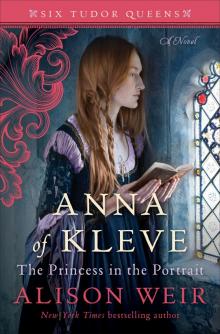 Anna of Kleve, the Princess in the Portrait
Anna of Kleve, the Princess in the Portrait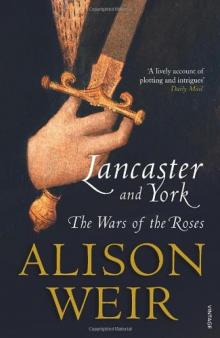 Lancaster and York: The Wars of the Roses
Lancaster and York: The Wars of the Roses The Grandmother's Tale
The Grandmother's Tale The Princess of Scotland (Six Tudor Queens #5.5)
The Princess of Scotland (Six Tudor Queens #5.5)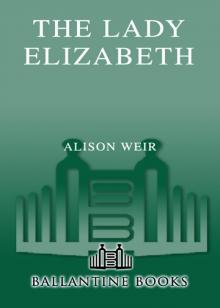 The Lady Elizabeth
The Lady Elizabeth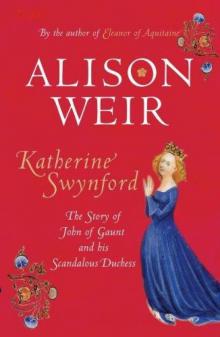 Katherine Swynford: The Story of John of Gaunt and His Scandalous Duchess
Katherine Swynford: The Story of John of Gaunt and His Scandalous Duchess The Curse of the Hungerfords
The Curse of the Hungerfords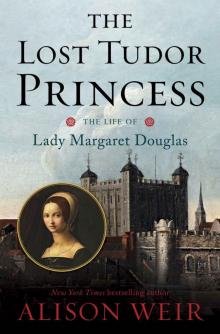 The Lost Tudor Princess: The Life of Lady Margaret Douglas
The Lost Tudor Princess: The Life of Lady Margaret Douglas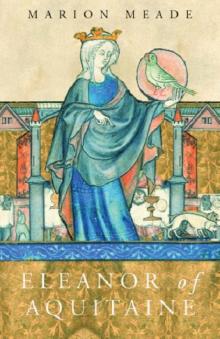 Eleanor of Aquitaine
Eleanor of Aquitaine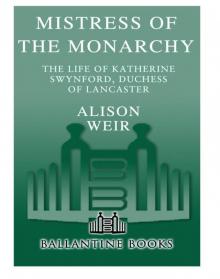 Mistress of the Monarchy
Mistress of the Monarchy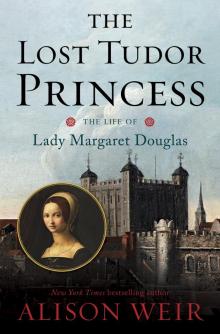 The Lost Tudor Princess
The Lost Tudor Princess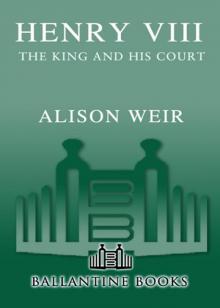 Henry VIII
Henry VIII Anne Boleyn, a King's Obsession
Anne Boleyn, a King's Obsession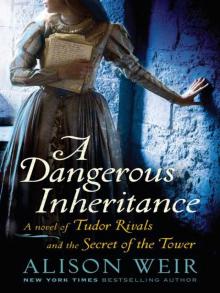 A Dangerous Inheritance: A Novel of Tudor Rivals and the Secret of the Tower
A Dangerous Inheritance: A Novel of Tudor Rivals and the Secret of the Tower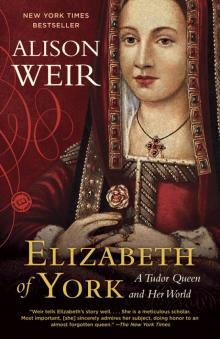 Elizabeth of York
Elizabeth of York Katherine of Aragon, the True Queen
Katherine of Aragon, the True Queen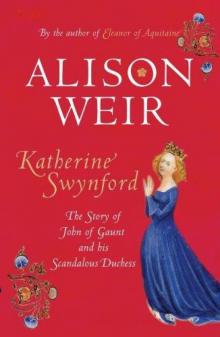 Katherine Swynford
Katherine Swynford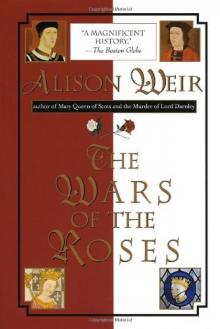 Wars of the Roses
Wars of the Roses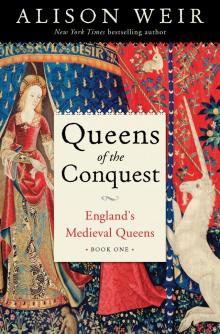 Queens of the Conquest
Queens of the Conquest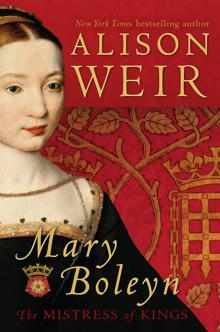 Mary Boleyn
Mary Boleyn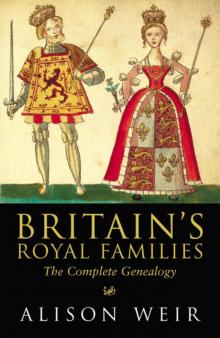 Britain's Royal Families
Britain's Royal Families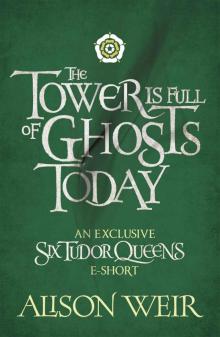 The Tower Is Full of Ghosts Today
The Tower Is Full of Ghosts Today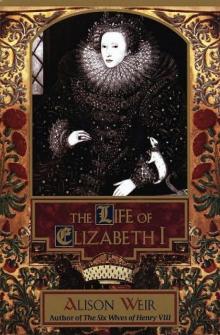 Life of Elizabeth I
Life of Elizabeth I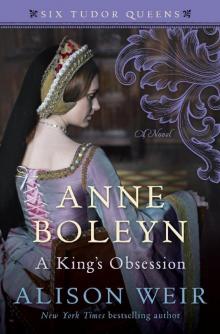 Anne Boleyn A King's Obssession
Anne Boleyn A King's Obssession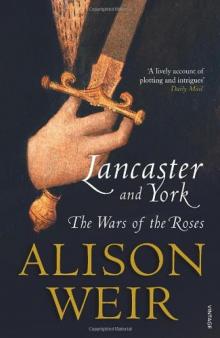 Lancaster and York
Lancaster and York Jane Seymour, the Haunted Queen
Jane Seymour, the Haunted Queen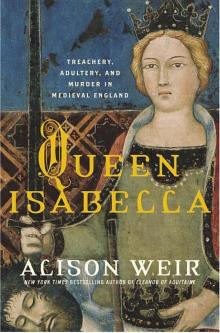 Queen Isabella
Queen Isabella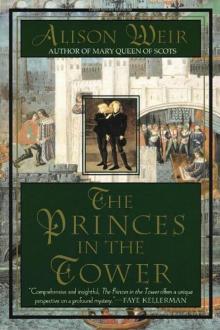 The princes in the tower
The princes in the tower